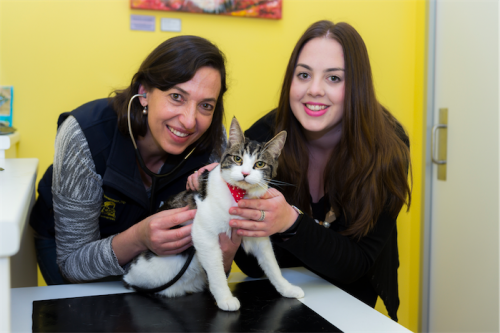
Jana Stevenson, veterinary surgeon at Curtin Vet Clinic, left and Alexandra Craig with Robinson… “Cats can be valuable for companionship and I wouldn’t want to deny anyone the right to have a pet… but we don’t want them to have eight kittens!” Photo by Andrew Finch
“A lot of people think that desexing their cat isn’t important because it’s only one cat and can’t make that much of an impact,” Alexandra says.
“However, when you factor in that one cat can have up to three litters a year, with up to eight kittens per litter, that’s potentially 24 kittens. Then if those 24 kittens go on to be responsible for 24 kittens each… and the cycle continues.”
Alexandra started the Canberra Cat Fix in March to help with the issue of unwanted cats in Canberra.
Applications for the first round of desexing closed at the end of June, with Alexandra now going through the 200-plus applications before the actual operations start in July.
“It’s not easy to determine who deserves the service, but we have specified that those with a Healthcare card will receive priority, then it’s first come first served,” she says.
“We’re processing the applications in batches to make sure we have enough funding. And once this round is done, as long as we continue to raise more money we’ll definitely open again for round two.”
Fundraising is through gofundme, and so far Alexandra has raised close to $3500, including $1000 from the ACT Government Community Support Fund.
She says that with this money, Canberra Cat Fix is able to provide a more affordable desexing service, charging as little as $45 for females and $35 for males for those with a Healthcare or Pension card, as opposed to around $400-plus for females and $350 for males.
Jana Stevenson, veterinary surgeon at Curtin Vet Clinic who’s participating in the Canberra Cat Fix, says it’s best to get cats desexed early.
“The age of the cat causes a problem, as well as the cost,” she says. “Cats are spontaneous ovulators so they’re always fertile, and they mature quickly – by four to five months they can be on heat.
“All rescue groups desex at eight to 10 weeks, as long as the cats are healthy.
“Many vets advise to do it at six months but the only way to prevent pregnancy is to desex early – the earlier the better.
“We’re the capital but we’re behind on this compared to other states. We need to start with the basics.”
Alexandra says she rescues unwanted cats being offered online – including Robinson, who she rescued from a buy-swap-sell page and ended up keeping – and has volunteered for cat rescue groups around Canberra, so she was keen to get to the source of the problem.
“Cat containment is a good thing, but it doesn’t go far enough,” she says.
“We need to reduce the amount of cats roaming the streets at night, which will protect native wildlife, reduce the amount of unwanted kittens and the risk of the spread of disease.”
Alexandra said she started crowdfunding, running barbecues and even had a donation from a session of No Lights No Lycra (where they ran an animal-themed playlist) to raise money.
She also emailed vets around Canberra to explain what she was trying to do and, so far, has Kippax Veterinary Hospital and Curtin Vet Clinic on board.
“It’s not just for young cats – we’re also concerned for cats who have had litters already and, of course, it’s more urgent for outdoor cats,” she says.
Alexandra says it’s estimated that more than 150,000 cats are put down every year in Australia for no reason other than there not being enough homes for them.
“The over-breeding stems from the high cost of desexing, vaccinations and microchipping,” she says.
She says that Canberra has a lot of stray cats, but that the problem is exacerbated by the fact that many cat owners just can’t afford the high vet fees for the procedure.
“Cats are beautiful animals, low-maintenance and with different personalities. They can be valuable for companionship and I wouldn’t want to deny anyone the right to have a pet,” she says.
“But we don’t want them to have eight kittens!”
Donations for Canberra Cat Fix can be made at gofundme.com/canberracatfix, 100 per cent of all donations go directly to desexing. More information at canberracatfix.wix.com/canberracatfix
Photos by ANDREW FINCH



The post Alex’s safe-sex fix for the love of cats appeared first on Canberra CityNews.